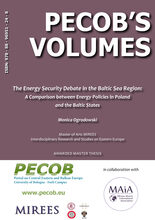and Balkan Europe
by IECOB & AIS Università di Bologna

The Energy Security Debate in the Baltic Sea Region: A Comparison between Energy Policies in Poland and the Baltic States
by: Monica Ogrodowski
ISBN: 978-88-96951-24-8
In collaboration with:
MIREES Alumni International Association (MAiA)

Abstract
The object of this research is the energy security situation and possible future developments in the Baltic Sea Region. The goal is to explore the energy security situation in the region by comparing the energy policies of the three Baltic States and Poland in the context of contemporary issues of energy security and wider EU-Russia relations. The task is to then identify potential and assess already-exisiting areas of cooperation in the energy sector within the framework of the EU and show that a concerted regional approach to strengthening energy security can lead to a more unified EU energy policy. The main analytical framework will be Barry Buzan’s Regional Security Complex Theory as it applies to the securitization of energy dependence in the BSR; theories of interdependence will factor into the discussion on the wider context of EU-Russian energy relations.
Table of contents
Chapter 1. Introduction
1.1 Research object, aims and tasks
1.2 Relevance of topic and newness of approach
1.3 Research design
1.3.1 Methodology
1.3.2 Sources
1.4 Structure and description of chapters
Chapter 2. Contemporary Issues of Energy Security: The Baltic Sea Region in EU-Russia Energy Relations
2.1 Historical and analytical framework
2.1.1 Securitization of Energy Dependency
2.1.2 Challenges to a unified EU energy policy
2.2 Energy Security as a Concept
2.2.1 Defining “energy security” in the BSR
2.2.2 Regional Security Complex Theory and energy dependence in the BSR
2.2.3 The BSR in the context of EU-Russia energy relations
2.3 Geopolitical context and political economy of energy trade
2.3.1 Securitization of Energy Dependence
2.3.2 Different post-Soviet trajectories of development
2.3.3 Regional energy interests and key issues: differing priorities and inconsistencies
2.3.4 EU Energy Policy: A framework for internal and external relations
Chapter 3. A Comparison of Polish and Baltic Energy Policies
3.1 Energy security strategies in the BSR
3.2 Energy Policies of Poland, Lithuania, Estonia and Latvia
3.2.1 Poland
3.2.2 Lithuania
3.2.3 Estonia
3.2.4 Latvia
3.3 Impact of energy security on other sectors of security
3.3.1 Nord Stream and the former Soviet bloc
3.3.2 Belarus and Ukraine as transit countries
3.3.3 Poland as a major player in European energy relations
3.3.4 Gazprom Engagement in the Baltic Sea Region
3.4 Existing structures and future prospects for Baltic regional cooperation
3.4.1 Baltic Market Interconnection Plan (BEMIP)
3.4.2 Prospects for regional cooperation
Chapter 4. Conclusions
4.1 Future prospects and possible developments
Bibliography
Author’s Biography
PECOB’S VOLUME: SELECTED MIREES MASTER THESES
The initiative of:
University of Bologna, Vytautas Magnus at Kaunas, Corvinus of Budapest and St. Petersburg State University, together with University of Ljubljana and University of Zagreb
In collaboration with:
MIREES Alumni International Association (MAiA)
Institute for Central-Eastern and Balkan Europe (IECOB)
Selection coordinated by:
MIREES Faculty Academic Council
Editorial coordination by:
Prof. Francesco Privitera, MIREES Programme Director
Adriano Remiddi, President of the MAiA Executive Board
Giovanni Cadioli, MAiA Editorial Manager
Luciana Moretti, IECOB Editorial Assistant
PECOB: Portal on Central Eastern and Balkan Europe - University of Bologna - 1, S. Giovanni Bosco - Faenza - Italy
Chiudi la versione stampabile della pagina e ritorna al sito.
 Download the full paper!
Download the full paper!